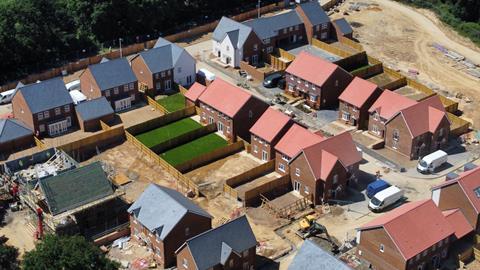How can the new government address the UK’s growing housing crisis as the sector faces an uphill battle?

Owing to challenges to supply, uncertainty regarding funding, and unease over building safety regulations, the housing sector is facing an uphill battle. But with this also comes opportunity — like the Net Zero Carbon Buildings Standard and the use of government land for housing.
In June, with the general election a matter of days away, the critical issues shaping the housing landscape were at the heart of a roundtable assembled by Housing Today.
The panel of experts, who gathered in the INNSiDE hotel by Mélia in Manchester, had two key issue to discuss. What are the industry’s priorities for the new government? And, how do we overcome the burdens limiting the number of homes being built?
The roundtable, sponsored by affordable housing developer Edaroth by AtkinsRéalis and regeneration company Urban Splash, was chaired by Housing Today’s head of content, Carl Brown.
What really can be achieved?
“The gap is enormous,” said Suzy Jones, director of the future at Urban Splash, addressing the disparity between the number of homes needed to be built each year to solve the housing crisis and the amount which can actually be delivered following the carbon budget set out by the UN Paris Agreement.
The carbon budget is a legally binding restriction on the overall amount of greenhouse gases the UK can emit over a five-year period. If emissions rise in one sector, the country will have to reach corresponding falls in another.

“Every political party is pretty much saying we need to build 300,000 homes,” said Jones.
“If we’re in the Paris Agreement […] we do not have the carbon budget to do that. We have a carbon budget to deliver 14,000 homes,” she added.
In fact, for Kate Davies, managing director at Buena, we actually need more like two million social homes.
“I think it’s an achievable target without masses of extra money, probably within existing budgets that could be achieved. I mean, it’s a radical idea, but I think that’s achievable,” she argued.
Around the table
Chair: Carl Brown, head of content, Housing Today
Richard Bayley, strategic advisor, AtkinsRealis
Trina Chakravati, programme director, Building Better
Kate Davies, managing director, Buena
Shelagh Grant, chief executive, The Housing Forum
Simon Hourihan, project director, Muse
Suzy Jones, director of the future, Urban Splash
Helen Spencer, executive director of growth, Great Places
Danny Thorpe, head of public affairs, Clarion
Davies said her two million figure was based on estimating how many homes originally in the public sector ending up going into private hands as a result of Right to Buy.
“Now there is a huge housing shortage because we’ve sold so much of the stock, and if we had two million extra social homes, we probably wouldn’t have the problems that we have,” she said.
Jones disagreed, believing we need to focus on the effects of housebuilding for future generations and making sure we don’t outsource the impact of our choices to the global south, but she was clear: “I have some ideas but I don’t have all the solutions,” she said, later adding: “I don’t think anyone knows what the solution is – I don’t know if there is a golden bullet; perhaps the collective thinking around this table can be a step towards that?”

She did, however, maintain that we need to prioritise seventh-generational stewardship when it comes to the built environment. This means “thinking about the impact of your actions and decisions across the next seven generations”, according to Jones.
Others too were eager to stress the importance of long-term planning in housing policy.
“I think my frustrations with the the manifestos have been the lack of a long-term, enduring ambition for housing, and it needs to be at least a 10-year plan,” said Shelagh Grant, chief executive officer of the Housing Forum.
“We shouldn’t be expecting the market to provide all the housing the country needs; there should be other ways of freeing up resources to go into what we need,” she said, citing a lack of space in London, Sheffield, Leeds and Manchester to house people.
“Think about the future in terms of those cities: how they function, how the older parts function, and the potential for regeneration,” said Grant.

The first 100 days
Richard Bayley, strategic adviser at AtkinsRéalis, said that if there is one plea for the new government from everyone around the table, it is: “Get us in to help you in the first 100 days.”
Helen Spencer, executive director of growth at Great Places, suggested that one thing which should be championed in the early days is affordability in the rental market.
“There might be a route to think about changing funding arrangements if there is a change in the way rent is charged when energy costs are factored in,” she said. Spencer therefore advocates for the possibility of exploring rent settlement, taking into account costs in the energy crisis.
Trina Chakravati, programme director at Building Better, expressed that there should be a mechanism available for supporting housing associations to make choices on principles best for them in their specific region.
She said initiatives such as Passivhaus, design principles used to achieve high levels of energy efficiency in buildings, and operational net zero carbon construction “are being driven by an individual in those businesses”.
Based on conversations Chakravati has had with members of Building Better, she prefers the introduction of a mechanism that “would allow the individual housing association based on their own values and their own community to make a choice about where they decide is their priority”.
Danny Thorpe, Clarion’s head of public affairs, hoped the next government would introduce a serious regional and national infrastructure plan, owing to his view that there is much to “unlock” across the UK.
He felt such a plan needed to come with “clear commitment, clear funding, and clear prioritisation” recognising that for some areas the focus will be on health services, whereas for others it should be transport.
What planning challenges does the sector want tackled first?
One issue that has been an undeniable problem for unlocking the delivery of housing has been the issues with the planning system.
Partway through the conversation Housing Today’s Brown turned the conversation to what the sector needs early in the new government’s tenure to unlock the planning system and help deliver the homes the country needs.
The Housing Forum’s Grant said the chronic under-resourcing of planning departments is something the industry would love to see tackled in the first 100 days of the new government.
“There is a genuine lack of resource in the planning profession as far as the public sector is concerned there – is a great shortage of planners,” she said.
“An idea could be some early conversations with academic institutions to get training planners, perhaps those in their qualifying year, into the profession early because it seems to be a manpower issue, a personnel power issue, and that could help address that.”
Clarion’s Thorpe added that while he feels the term “planning reform” is bandied about too often, there are definitely areas that need addressing.
“One thing, I think, is the idea that you can buy a planning performance agreement, which most people think is a good thing, but only buys you X part of the planner, rather than all of the other functions that may exist within a local authority centre required to comment on that planning application. I think sometimes people have a misconception about that, and we need to try and understand that,” he said.
Spencer of Great Places added while there is often exasperation with local authority planning departments, that is not the sole cause of delays.
She said: “Often it gets forgotten that a lot of the delay doesn’t actually sit with a local planning authority. It’s actually out at the back end with the consultees, so there’s a resourcing issue which goes far beyond the local planning offices.”
While the panel agreed that there are issues which need to be tackled early by the new government, they were cautious about calling for full-system reform.
Thorpe said the number one priority of the housing association is an “urgent” injection into public service funding, especially for local authorities.
“When we look back at the past 18 months at Clarion, what we can really see is we’re increasingly having to step up and provide support well outside the core business,” said Thorpe, explaining that business had been providing school uniforms and supporting food banks in local communities.
For Davies, increasing the budgets of local authorities is not the right answer. “You have to have a much more radical approach,” she said, offering the idea of using some public land for housing, including land designated as green belt.
To house more people, asked Jones, “are we really using existing built assets as effectively as we could? We have a housing crisis but do we really have a property crisis? How much real estate is actually empty?”
Building site safety matters
Simon Hourihan, project director at Muse, held that we need a higher standard of building across the board through regulation.
He said with the building regulations process currently in place, the “lack of due diligence and quality control” has meant that while his company builds homes for a local authority which will not require retrofit until 2050, that same authority has also hired firms to build homes that will need retrofit.

“Standards aren’t tight enough,” said Bayley, in agreement with Hourihan.
“We’re building homes in the UK that perform up to 60% less than we think they do, which is all down to current standards and regulation, the building regs and the way in which we’ve done things that people do the same way,” said Hourihan.
“Anything we can do now to ensure that the cavity barrier is installed or you don’t use combustible materials, this whole way around with Passivhaus and the principles of developing sustainable buildings — it’s just the same, and I think the penny will drop eventually,” he added.
What about MMC?
Modern methods of construction (MMC) were a topic of interest among many attendees — a hope for their prioritisation within the incoming government voiced by a few.
Referring to discussions in the past couple of years over MMC and productivity, Jones wondered, “How do we actually take the opportunity to make them happen in this country at scale? Because we’ve not been able to do so.” She added that if this was worked out MMC could be part of the solution, because of the speed at which homes can be produced and the use of sustainable materials.
Bayley said he would like to see reform of economic appraisal and development appraisal models, which he believes are “wholly out of date”.
The benefits of MMC should now be factored into the way development appraisals are done and considered as part of viability considerations, he added.



























No comments yet